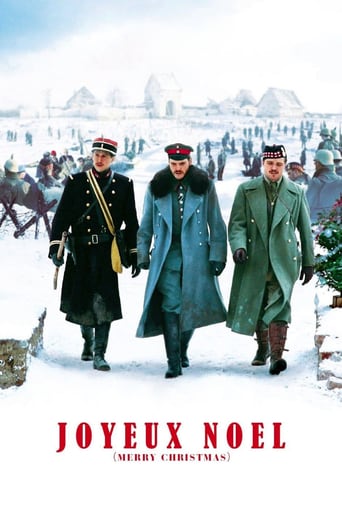D_Burke
Among the many films that take place during Christmas, most succeed in entertaining. Some give a credible message of hope with which audiences genuinely identify.However, only two movies of which I know succeed in moving audiences and rekindling their hope in the virtues of which mankind is capable: "It's A Wonderful Life" (1946), and this movie."Joyeux Noel" is not just a Christmas movie. I imagine anyone who sees this film will make an emotional connection to it regardless of their race, color, or creed.Based on a true story, the film chronicles the start of what was then known as the Great War, but what we know today as World War I. It's hard to believe when you read about WWI in a text book, but at the time, it was the bloodiest war in (then) recent memory.It's also easy to forget how senseless the war actually was from the very beginning. However, this film succeeds in emphasizing the inhumanity of war through a brilliant beginning montage of children from England, France, and Germany reciting actual text from each nation's respective official war declarations.Putting children in these parts was a smart move, because your attention wouldn't perk up if an adult was saying these lines. When children are seriously discussing war in a classroom, and not on the playground, you know something's amiss. Adding to the cold authenticity, the children speak in their own languages."Joyeux Noel" was filmed and financed in France, Germany, Romania, and Scotland. It's important to note this fact because if it got near Hollywood, EVERYONE in it would be speaking English, a move that regularly damages the credibility of many American films that take place overseas.The film continues showing civilians from France, Germany, and Scotland right when war breaks out in 1914. One young Scottish man is excited to enlist, stating that it is the "start of (his) life". His local priest, Father Palmer (Gary Lewis), is not so sure.You are also introduced to two famous German opera singers who are also lovers, Anna Sorenson (Diane Kruger) and Nikolaus Sprink (Benno Furmann), whose voices are heaven sent. Neither singer is required to enlist in the Great War, but they are both sent to the German front lines to entertain the troops on Christmas Eve.After a few more introductions, we see the Western Front of the war in France, with French, German, and Scottish soldiers engaging in combat that is far from romantic. You see the trenches, not so much of the actual combat, but you don't have to guess how ugly the war actually was.Even worse, these soldiers are fighting on Christmas Eve, when many of them looked forward to returning home to their families. Eventually, what begins as Anna and Nikolaus singing for the German soldiers results in the lieutenants of each platoon agreeing to a Christmas Day ceasefire. However, thanks to these opera singers, what further evolves becomes something more uplifting and moving than just a day off.In 1914, the Great War was far from over. To those fighting in it, there seemed to be no end in sight. However, on that Christmas Eve, as this film so brilliantly elaborates, the battle grounds became an actual common ground for all the troops. Seeing that gradual metamorphosis of the land and the soldiers is truly breathtaking.From this point of the movie on, you may become an opera fan if you weren't one before seeing this film. You will look at the World War I German army in a far better way if you're an American or British person. World War II may be a different story, but go along with me here.Finally, you may never listen to "Adeste Fideles" (the Latin version of "O Come All Ye Faithful") the same way again. It's even more astounding how great holiday songs become better through the darkest of times, and that is probably the point of the entire movie.Just like "It's A Wonderful Life", "Joyeux Noel" details a bleak time in history, and shows how the human spirit of generosity can make a world of difference through even the darkest times. The comparisons to the 1946 classic don't stop there."Joyeux Noel" has a story line that gradually builds to a grand conclusion, and the sum of the previous events is not equal to its parts. Like "It's A Wonderful Life", the thrill is seeing how all the circumstances come together to create that conclusion. It may be complicated to detail to friends, but once you see the movie, you realize it's more profound than just cocktail party chatter.While these two movies differ greatly in their plots, they also have a few other things in common. "Joyeux Noel", with a budget of $22,000,000, made less than that worldwide, thereby making it a flop. It also was nominated for an Academy Award for Best Foreign Language Film in 2005, but lost.However, just like "It's A Wonderful Life", it will be considered a classic soon. It may not be next year, but it could be 10 years from now, or even 20. It's not just an entertaining film, but a truly great and important film.There are no magic tricks in this film to remind the characters about the true meaning of the holiday season, and for good reason. Kindness and charity are things of which all humans are capable even in terrible times. "Joyeux Noel" gets that idea. I only hope that others who see this remarkable cinematic achievement will take away that message, and still come back to the movie year after year.
Desertman84
Joyeux Noel captures a rare moment of grace from one of the worst wars in the history of mankind.This is a movie about the World War I Christmas truce of December 1914, depicted through the eyes of French, Scottish and German soldiers.It stars Benno Fürmann,Guillaume Canet,Daniel Brühl,Diane Kruger,Gary Lewis and Alex Ferns; and it was written and directed by Christian Carion.When the war machines began rolling in the summer of 1914, the devastation that it waged upon German, British, and French troops was palpable. As the winter winds began to blow and the soldiers sat huddled in their trenches awaiting the generous Christmas care packages sent by the families, the sounds of warfare took a momentary backseat to the yearning for brotherhood among all of mankind. It is here that the fate of a French lieutenant, a Scottish priest, a German tenor, and a Danish soprano's lives were about to be changed forever. On Christmas Eve of that year, the lonely souls of the front lines abandoned their arms to reach out to their enemies on the battlefield and greet them with not anger or hostility, but with the simple, kindly gesture by trading chocolates and champagne, playing soccer, and comparing pictures of their wives and to put their differences aside long enough to wish each other as brothers a sincere Christmas greetings to one another.But when Christmas ends, the war returns.The movie captures a rare moment of grace from one of the worst wars in the history of mankind, World War I.Although it has been justly accused of sentimentality and manipulation, but if any subject warrants such an earnest and hopeful treatment, it's the horrors of trench warfare. The cast delivers low-key but effective performances as the movie dwells on the everyday elements of life in the face of war.In the end,this is one film that is a marvelously entertaining history lesson that is glossy, emotional and touching that a viewer should not miss.





